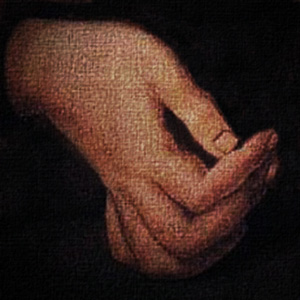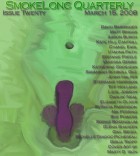Shaozu’s apartment seemed further away this evening. As usual, the battered grey bus dropped him with the other workers at the intersection and he walked the rest. But his old feet seemed heavier than yesterday. Even the air in his empty lunch bag weighed down his shoulder.
Huang was crouched in the doorway, throwing knucklebones in the dust. He looked up at Shaozu.
“Sometime, we must come to the end of all possible permutations,” he said.
The air in the apartment was still. Perhaps Mei was out. Perhaps she had gone to the late market, or left a note to say there was a last-minute game of Wei-Ch’i.
But on the table in the kitchenette, Shaozu found no note. Instead, in a room in which everything had been put in its correct place, cloths neatly folded, platters arranged in careful pyramids, he found something else.
Mei’s hand.
It instilled no panic. Not even a sense of worry. The hand lay quite peacefully palm up, the fingers curled like a half open lotus. There was no blood; not a single drop. It might have been a waxwork. But it was definitely Mei’s hand. There was her plain gold band, the small scar on the index finger. And there on every single nail was the clear varnish from their anniversary dinner, chipped, where only this morning she’d been scraping at a thumbnail with the index nail of the other hand.
Shaozu walked round the table peering at the hand. It mattered that he should know which hand this was. The one whose thumbnail had been scraped, or the one whose index had done the scraping.
And it mattered that the hand was alone.
Shaozu thought of calling to his wife. He thought of standing in the kitchenette and calling, “Mei? I have found your hand…” but there was something quite wrong with that, as though he would be disturbing a shrine.
In the hallway, he found her right foot. He had walked straight past it, lined up neatly beside her sandals. He crouched and put out a tentative hand. The foot was cool.
Picking it up, he returned to the kitchenette and placed the foot on the table next to the hand. After all, the wrong partner was better than no partner at all. Loneliness is a dreadful thing.
Slowly, Shaozu moved through the apartment, searching. He found Mei everywhere. Her legs below the knee, one in the shower room, one on the balcony. Her arms, one in the drawer of the console table, one on a kitchen shelf. A shoulder, high in the hallway on top of the cupboard where they kept their outdoor clothes.
He found her stomach, rounded as a child’s, on the pillow in the spare bedroom. The room where, very occasionally, their son slept when his work brought him to the city.
Shaozu picked up each part with care, bringing them all into the kitchenette, laying them together on the table. He did not try to reassemble her. He laid them in the general order in which he found the parts, as that seemed proper.
For a while Shaozu was unable to go to the room where he and Mei had slept for forty years. He found his eyes pricking. He found himself recalling Mei’s voice the other night, over dinner:
“My husband. I have something to tell you.”
And her quiet life-litany. A marriage agreed to for money. A lack.
In the bedroom, he hoped he might find two things. Mei’s little face with its bright eyes and high cheekbones. And her heart.
But some things, no matter how close they may have been, are never found at all.



 The core workshop of SmokeLong Fitness is all in writing, so you can take part from anywhere at anytime. We are excited about creating a supportive, consistent and structured environment for flash writers to work on their craft in a community. We are thrilled and proud to say that our workshop participants have won, placed, or been listed in every major flash competition. Community works.
The core workshop of SmokeLong Fitness is all in writing, so you can take part from anywhere at anytime. We are excited about creating a supportive, consistent and structured environment for flash writers to work on their craft in a community. We are thrilled and proud to say that our workshop participants have won, placed, or been listed in every major flash competition. Community works.